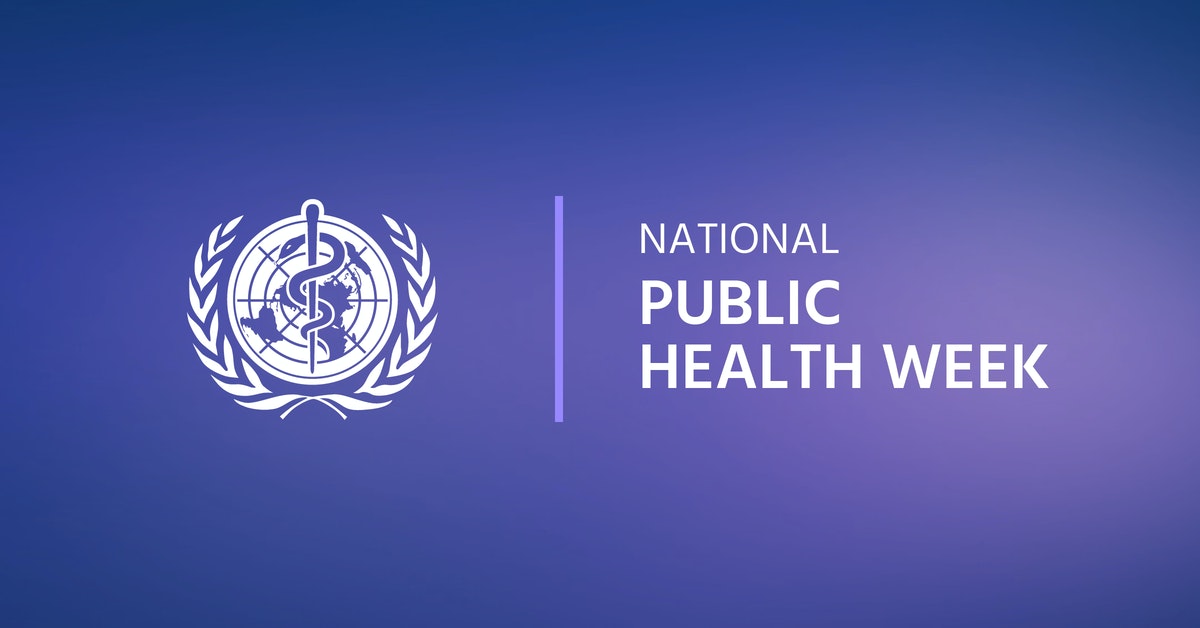For the past 25 years, National Public Health Week has been a time set aside to recognize the contribution of public health workers and raise awareness regarding important issues that directly impact the public's health.

Celebrating National Public Health Week 2020
This year's National Public Health Week fell on April 6th through April 12th, while many of us were quarantined in our homes due to a state-wide shelter-in-place order as a result of one of the most significant public health issues of our time--the COVID-19 pandemic.
The theme for this year's National Public Health Week was "Looking Back, Moving Forward," a concept all too relevant to present circumstances.
Each day of the week was assigned a specific public health topic:
- Monday - Mental Health.
- Tuesday - Maternal and Child Health.
- Wednesday - Violence Prevention.
- Thursday - Environmental Health.
- Friday - Education.
- Saturday - Healthy Housing, and;
- Sunday - Economics.
As of the time of this writing--Thursday, April 9th--it seems more appropriate than ever to discuss the importance of environmental health and the impact we all have on it, the facilities we spend most of our day inside of, and each other.
The Impact of Environmental Health on Public Safety
There are two critical criteria that directly impact environmental health and public safety:
- Individual action and hygiene, and;
- Facility cleaning practices.
Improving Environmental Health Through Individual Action
The recent outbreak of COVID-19, combined with a devastating influenza season, and a typical norovirus season underscored the importance of recognizing how our behavior and personal hygiene presents a risk to those around us.
At-risk groups for most infectious disease fall into the same categories:
- The elderly.
- Young children, and;
- Those with pre-existing health conditions, especially heart or respiratory issues, or cancer.
Those with healthy immune systems can still succumb to illness, but are more likely to spread the disease to others due to a lack of what we are now referring to as social distancing.
The U.S. Centers for Disease Control and Prevention has always recommended, first and foremost, that regardless of the illness--be it coronavirus or the flu-- you stay home and avoid going out into public unless necessary.
For years, long before the emergence of COVID-19, businesses have been encouraged to extend paid sick leave and the option to work remotely from home to curtail the spread of seasonal illness.
Further, hand awareness and hygiene compliance--something all too important in today's new normal--was lax at a troubling level across all demographics, ultimately resulting in the transmission of preventable disease, illness, and death.
While in public, especially during cold and flu season, it is imperative that individuals:
- Pay attention to where they are putting their hands.
- Wash them frequently with soap and water for at least twenty seconds.
- Dry them thoroughly.
- Avoid touching their face, and;
- Practice socially acceptable behavior after coughing or sneezing.
The addition of hand sanitizer can help tremendously as an aide, but its effectiveness is contingent upon adhering to how well a person washes their hands with soap and water.
Protecting Public Health Through High-Performance Facility Cleaning
In regards to safeguarding, ensuring, and improving public health, it is crucial to recognize that the level of sanitation in a building is just as important as the method in which it is sanitized.
In the past, all too often, toxic cleaning products and equipment far past their safely usable date were employed to clean facilities for appearance, as opposed to the purposes of health and occupant safety.
The toxic cleaning products have a demonstrably negative impact on the short-term wellbeing of building occupants, often showing up immediately in reduced cognitive functions and productivity, as well as long-term health, resulting in respiratory issues, reproductive harm, and various forms of cancer.
Poorly maintained and outdated equipment are commonly the source of germ and bacteria transmission from room to room or one surface to another--a challenge generally referred to as cross-contamination.
Conversely, high-performance cleaning systems focused on occupant health leverage state of the art equipment and products certified by the U.S. Environmental Protection Agency and third-party watchdogs, such as the Environmental Working Group, to ensure the right product is matched to the correct surface, environment, and need.
Where possible, only environmentally preferable products are used indoors to prevent air and water contamination and avoid passing toxic fumes and chemicals to building occupants.
References & Resources
- It’s National Public Health Week — Looking Back and Moving Forward with Cleaning for Health
- National Public Health Week and COVID-19
- How to Protect Yourself & Others
Takeaway
In order to take care of others and protect public health, we must first take care of ourselves, which means isolating ourselves when we are sick and keeping our hands clean, especially in public.
We must also recognize that we spend about 90% of our time indoors and prioritize the safe sanitation of the facilities we occupy every day to prevent the spread of illness as much as possible.
Cross-contamination prevention--one of the most critical skills a janitorial service provider can possess--takes years of training and ongoing discipline to maintain, and few are more qualified to provide that level of care than dedicated janitorial franchise business owners and operators.
If you would like more information regarding the effectiveness of high-performance infection prevention and control measures, or if you would like to schedule a free, no-obligation onsite assessment of your facility's custodial needs, contact us today for a free quote!
In Bakersfield CA, call (661) 437-3253
In Fresno CA, call (559) 206-1059
In Valencia CA, or Santa Clarita CA, call (661) 437-3253
In Palmdale CA, or Lancaster CA, call (661) 371-4756

